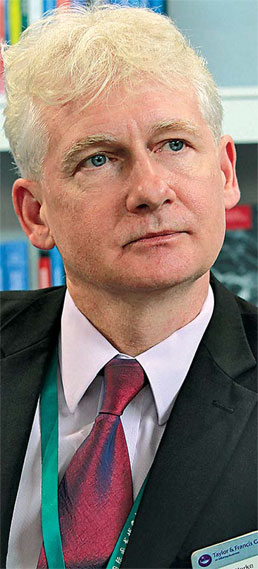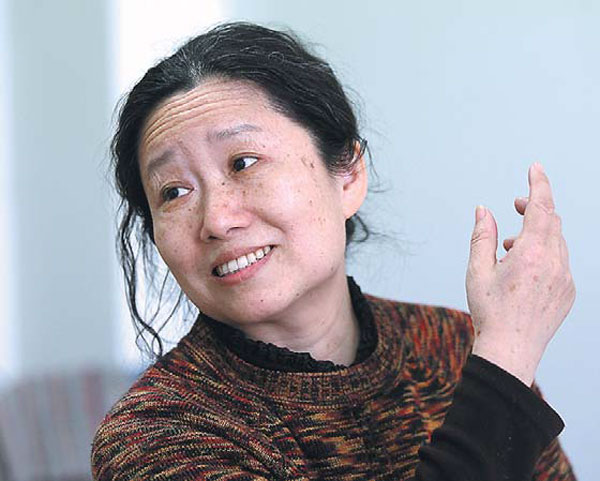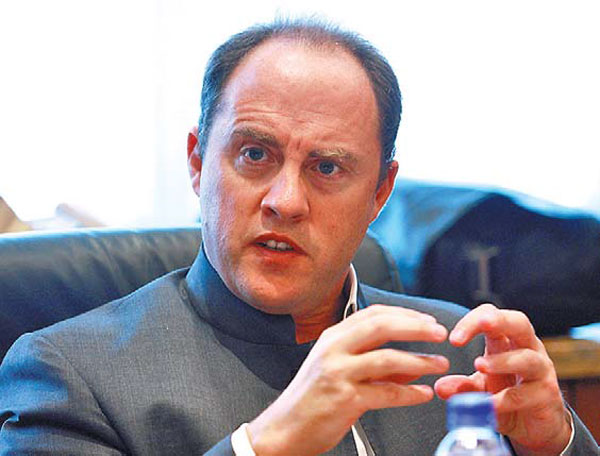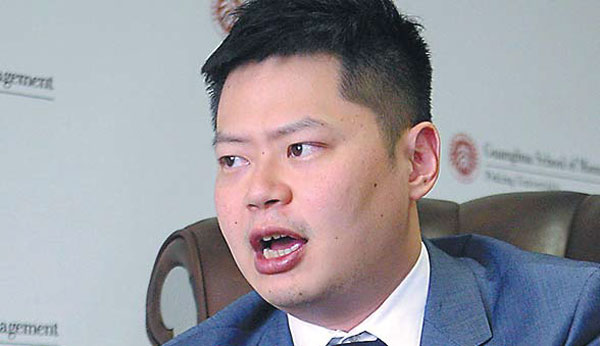Staying on top in times of change
Updated: 2015-04-10 08:14
By Andrew Moody(China Daily Europe)
|
|||||||||||
No longer the unassailable hero, the modern CEO in China must grapple with a rapidly shifting business world
Publishing boss Barry Clarke is on a recruitment mission. He has flown in from Singapore, where he is Asia managing director of academic publisher Taylor & Francis, to recruit a CEO for the company's China operations.
The company, whose origins date back to 1798 when co-founder Richard Taylor launched the Philosophical Magazine, needs someone who can cope with one of the fastest moving and most complex markets in the 21st century.
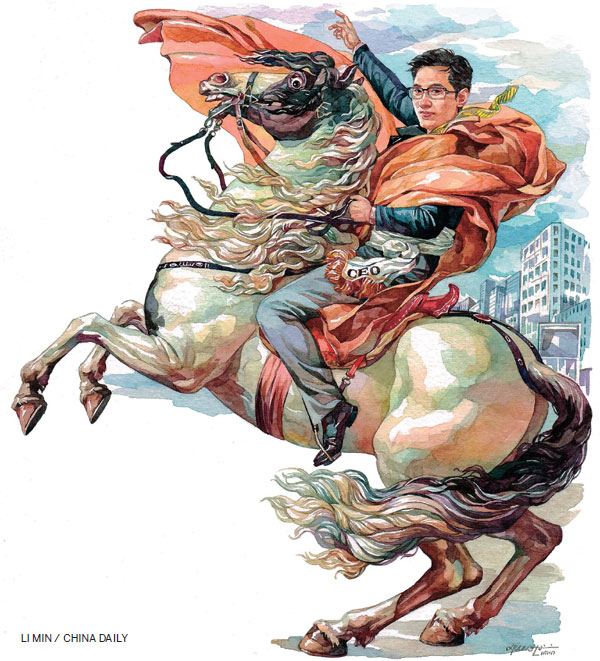
Over four days Clarke - with Christoph Chesher, group sales director - met with potential candidates at the Crowne Plaza Beijing Zhongguancun hotel in Beijing.
"We had been hoping to make a decision while here but two were such good candidates it might take another two weeks. We might have to fly them back to England so they can meet the board.
"It is a very important appointment. The successful candidate would be responsible for relations with government, key academic institutions and publishing partners."
Clarke, who has been in Asia for 23 years and has been visiting China for 21 of those, says a person chosen for the role of CEO is increasingly seen as a unique individual.
"Increasingly organizations are like some ecosystem and you have to have a person who can deal with that kind of complexity and also ambiguity."
He believes that someone who has to do the job in China often finds it even more difficult operating in a society with deep-set Confucian values.
"These values are often hard to pin down or verbalize. You certainly would never put them in a job description. One example, however, might be that you are looking for a person who is more contemplative and reflective as well as perhaps half a dozen other traits you are looking for."
What capabilities a modern CEO needs - both in the West and in China - has been examined in The CEO Report: Embracing the Paradoxes of Leadership and the Power of Doubt, published by global executive search firm Heidrick & Struggles and Said Business School at Oxford University.
It conducted extensive interviews with 152 CEOs from around the world, many of whom have operated and run businesses in China.
One of the most comprehensive pieces of research into the role of the CEO, those interviewed employed 5.8 million and generated revenues of $1.7 trillion (1.54 trillion euros).
Some 75 percent said the role had changed significantly in recent years and of those who said the role had not changed, a further 14 percent said the way they did the job had.
It concluded the modern CEO had to have a range of skill sets that bosses even five or 10 years ago did not need to possess.
He or she has to cope with a much faster business environment and has to deal with not only the speed of change but understand its scope and significance (what the report calls S3).
The modern boss also has to have "ripple intelligence" and see before anyone else the ripples or trends that might disrupt his or her business or market.
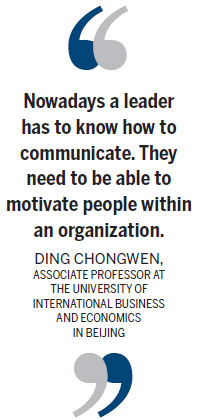
In addition, the CEO has to have the capability of not only choosing between right and wrong options but between alternative choices that might each be right for a particular stakeholder, though only one can be chosen.
The successful modern boss will also not succeed by just making clear-cut easy decisions. He or she will also have to harness what the report calls "the power of doubt" and make the right call in the many gray areas of the modern business world where it is not immediately clear what the right decision is.
Whereas the CEO in the past would be mainly the link between the organization and the shareholders and the board, his or her role is now much more messy, sitting in the middle of the intersection of the pyramid of the organization and that of various stakeholders. This is because so many stakeholders now have a direct role within an organization.
Michael Smets, associate professor in management and organizational studies at Said Business School and one of the authors of the report, says the role of the modern CEO is increasingly lonely and one you cannot really prepare for.
"Most CEOs will only have been second or third in line before, which is very different to being in the seat yourself. You cannot really practice before coming a CEO," he says.
Smets also says the modern CEO is a very different animal to the CEOs of the 1970s and 1980s, who might have been more of an alpha male and who may have liked doing much of his business networking on the golf course.
"I think most modern CEOs think the old command and control structures of the past are something of an illusion because of the multiple stakeholder groups he or she has to respond to," he says.
"The CEO can no longer be the unassailable hero but actually is likely to be a more authentic human, prepared to share vulnerabilities and have softer capabilities like listening and empathy while having far fewer of the alpha male power habits."
The management professor says that one of the big disrupting changes that the modern CEO has to deal with is the growing Asian middle class, particularly in China.
"The growing Asian middle class, the bulk of which comes from China, was the top preoccupation of those interviewed when asked to rank the top 10 major global trends."
At his company office on the 26th floor of China Central Place in Beijing, Thomas Luedi, managing partner, Greater China, for international management consultancy AT Kearney, believes the role of the CEO has changed markedly as a result of globalization.
"It is probably more pronounced in the China context than anywhere. If you go back 15 or 20 years the job of the CEO, whether that was in a state-owned or private enterprise, was that of a general manager, just keeping the organization together," he says.
"Now you have to be much more than just a manager - you have to be someone with a vision and of a much more entrepreneurial nature."
Over at the University of International Business and Economics in Beijing, Ding Chongwen, an associate professor, says the CEO has had to change in China or else be left behind since the whole business environment has transformed beyond recognition.
She says the Chinese CEOs of only a generation ago had an antiquated management style.
"To keep control of an organization leaders often used to keep things to themselves. They thought it made them look smarter if they knew all the answers. This insider game had to change, however."
Ding says there has been a move away from bosses hiding behind a Confucian veneer.
"We used to appreciate these quiet people in China because it was a Confucian tradition. Nowadays a leader has to know how to communicate. They need to be able to motivate people within an organization. This is a very big change from a generation ago," she adds.
In London, Steve Tappin is someone who follows global trends in the role of the CEO very closely.
He currently hosts the CEO Guru program on BBC World and runs Xinfu, his own consultancy advising CEOs.
He believes the Heidrick & Struggles report was right to highlight the speed of the modern business environment with information being tweeted and re-tweeted within seconds.
"The fundamental shift has been social media connectivity that has made everything more dynamic in real time. CEOs have to get used to working in an environment where not everything is in their control. They have to be far more intuitive," he says.
Tappin, who is also author of The Secrets of CEOs and has interviewed many CEOs in China, says what makes them stand out in China is how they have adapted to the new environment.
"They are also often very passionate, have big dreams and are relentless in their pursuit of them in a way that you do not encounter in other parts of the world."
One of the major questions about Chinese CEOs is whether they operate with the paternalistic hierarchical structures of the past.
Ding at UIBE believes such structures are no longer relevant to modern corporate culture.
|
Barry Clarke, Asia managing director of academic publisher Taylor & Francis. Provided to China Daily |
"I think the older structures are even dying out in the state-owned enterprises because of reform and market pressure. It is certainly the case in small and medium-sized enterprises. They have much flatter management structures and managers and there isn't the big distinction between the boss and other people in the team."
Jack Chiang, assistant professor of management at Peking University's Guanghua School of Management, has done research on paternalistic Asian management structures.
"That sort of paternalistic leadership style is probably not adaptable in Shanghai anymore but many small and medium-sized businesses in second- and third-tier cities still have it and it is pretty popular," he says.
"It still also appears in companies in Asia, such as Japan and South Korea."
Not all the CEOs operating in China are Chinese. Foreign multinationals have played a big role in the Chinese economy since the 1990s.
When China was in the early stages of its recent development, many companies did not deploy their high flyers as head of their China operations.
Often those filling the positions were people with specific Asian experience or old China hands whose main skill was familiarity with the language and culture.
Over the past decade as China has emerged as the world's second-largest economy and a key global market, multinationals have tended to deploy their biggest talents.
Some executives now believe that not having China experience might be a barrier to someone attaining the role of global CEO.
Chiang at Guanghua says the one country that seems to have been caught out by this trend is Japan.
"Whereas US and European companies have tended to send their top people, this has not been the case with Japan. Apart from the New York or London offices the best people within Japanese companies tend to stay at headquarters," he says.
"In fact, while someone coming to China might get a higher salary and live in a luxurious apartment, it will be generally assumed by everyone to be a demotion or that there have been some issues back home. I think this is one of the main reasons why Japanese companies have underperformed in the China market."
As well as having to cope with disruptive change, one of the biggest challenges ahead for Chinese CEOs is having to cope with a slowing economy.
Many have been used to GDP growth of near double digits but the "new normal" in China is a slowing and maturing economy.
A recent survey of 100 Chinese CEOs by international management consultants Accenture Strategy found that more than 50 percent were focused on efficiency.
"The big challenge for CEOs will be to manage costs down while at the same growth is slowing. They are also going to have to be more strategic in identifying new growth areas so there will have to be more focus on innovation and also develop new products and services," says Luis Cenega, the consultancy's Greater China managing director.
Luedi at AT Kearmey believes that many Chinese CEOs will be very good at achieving efficiency because many senior executives come from an engineering background.
"The challenge for them will be about re-engineering their organizations, driving efficiency in the operations. There will be a lot of technical elements to this and I think it will play to the strengths of the CEOs who come from engineering backgrounds," he says.
At Taylor & Francis, Clarke is still involved in the recruitment of a new CEO.
"We are looking for someone who is able to support our team in China. We want someone who is a team player and which can bring the leadership skills out from members of the team. We are also looking for someone who is fearless in making decisions.
"The most important quality though is someone who can provide balance and harmony and who has the emotional intelligence and the cultural awareness to deal with the complexities of China."
Yu Hang contributed to this story.
andrewmoody@chinadaily.com.cn
|
Michael Smets, associate professor in management and organizational studies at Said Business School at Oxford university. Provided to China Daily |
|
Ding Chongwen, associate professor at the University of International Business and Economics in Beijing. Zhang Wei / China Daily |
|
Steve Tappin, CEO of Xinfu and host of the BBC's CEO Guru. |
|
Jack Chiang, assistant professor of management at Peking University's Guanghua School of Management. |
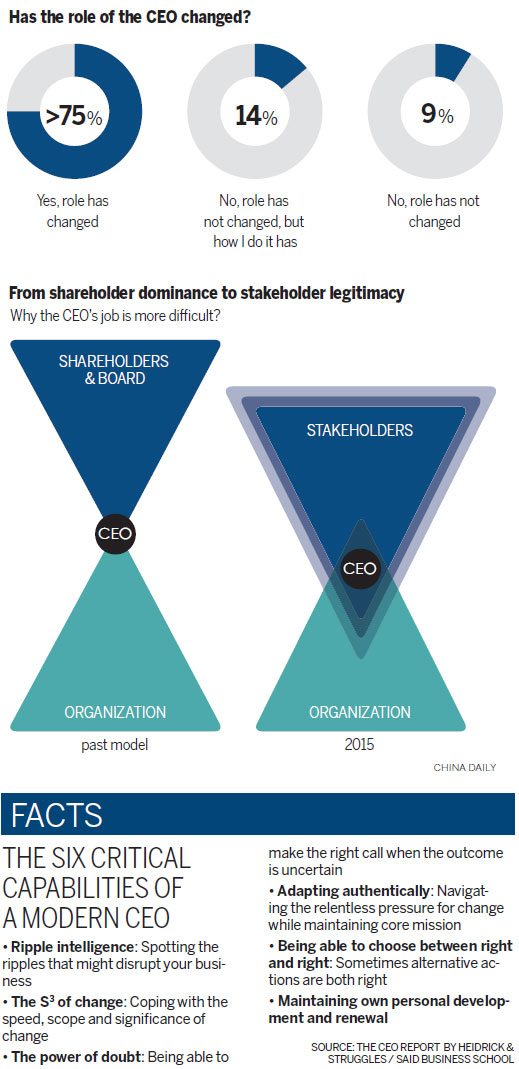
( China Daily European Weekly 04/10/2015 page1)
Today's Top News
Putin backs China's Silk Road proposal
Boston bomber convicted, may face death penalty
Zhou trial likely to serve as model
Belarus to expand trade and economic ties with China
Cause of China chemical plant blast identified
Fleeing war-torn Yemen, Chinese, foreign nationals share the same boat
Liu Xiang expected to announce retirement on Tuesday
Toilet revolution for tourism evolution: Opinion
Hot Topics
Lunar probe , China growth forecasts, Emission rules get tougher, China seen through 'colored lens', International board,
Editor's Picks

|

|

|

|

|

|
